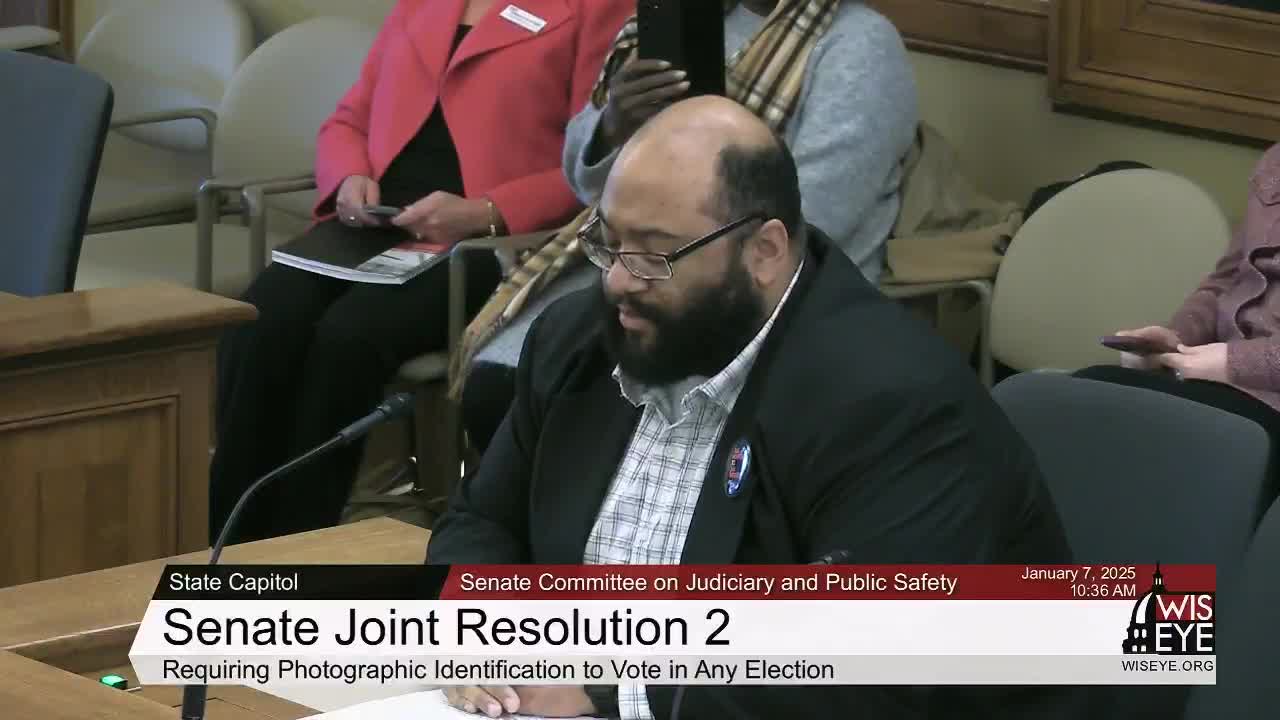Wisconsin lawmakers face backlash over proposed voter ID constitutional amendment
This article was created by AI summarizing key points discussed. AI makes mistakes, so for full details and context, please refer to the video of the full meeting. Please report any errors so we can fix them. Report an error »

The recent Senate Committee on Judiciary and Public Safety meeting in Wisconsin highlighted significant concerns regarding Senate Joint Resolution 2, which aims to enshrine photo voter ID requirements into the state constitution. Critics argue that this measure could further restrict access to voting, particularly for marginalized groups, including Black and brown communities, the elderly, economically disadvantaged individuals, students, and voters with disabilities.
During the meeting, public comments emphasized that Wisconsin's existing voter ID law already disproportionately affects these vulnerable populations. An estimated 11% of eligible voters in states with strict voter ID laws lack the necessary identification, with even higher percentages among historically disenfranchised communities. By embedding such restrictions in the constitution, opponents warn that it could create permanent barriers to voting.
Supporters of the resolution claim it is intended to protect election integrity. However, critics pointed out that many proponents were previously involved in efforts to undermine the 2020 election results, raising questions about their commitment to democracy. The meeting underscored that voter impersonation, the issue the resolution seeks to address, is virtually non-existent, and many alleged cases of voter fraud have been attributed to administrative errors.
The discussion also touched on the record-high voter turnout in Wisconsin during the 2024 elections, suggesting that the proposed resolution could dampen future participation. Advocates for fair elections argue that instead of imposing stricter ID laws, lawmakers should focus on improving access to the ballot, such as allowing absentee ballots to be processed earlier and ensuring that individuals involved in undemocratic activities are barred from overseeing elections.
As the committee deliberates on this resolution, the implications for Wisconsin's electoral landscape remain significant. The meeting served as a reminder of the ongoing debate over voting rights and the importance of ensuring that all citizens have equitable access to participate in the democratic process.
During the meeting, public comments emphasized that Wisconsin's existing voter ID law already disproportionately affects these vulnerable populations. An estimated 11% of eligible voters in states with strict voter ID laws lack the necessary identification, with even higher percentages among historically disenfranchised communities. By embedding such restrictions in the constitution, opponents warn that it could create permanent barriers to voting.
Supporters of the resolution claim it is intended to protect election integrity. However, critics pointed out that many proponents were previously involved in efforts to undermine the 2020 election results, raising questions about their commitment to democracy. The meeting underscored that voter impersonation, the issue the resolution seeks to address, is virtually non-existent, and many alleged cases of voter fraud have been attributed to administrative errors.
The discussion also touched on the record-high voter turnout in Wisconsin during the 2024 elections, suggesting that the proposed resolution could dampen future participation. Advocates for fair elections argue that instead of imposing stricter ID laws, lawmakers should focus on improving access to the ballot, such as allowing absentee ballots to be processed earlier and ensuring that individuals involved in undemocratic activities are barred from overseeing elections.
As the committee deliberates on this resolution, the implications for Wisconsin's electoral landscape remain significant. The meeting served as a reminder of the ongoing debate over voting rights and the importance of ensuring that all citizens have equitable access to participate in the democratic process.
View full meeting
This article is based on a recent meeting—watch the full video and explore the complete transcript for deeper insights into the discussion.
View full meeting